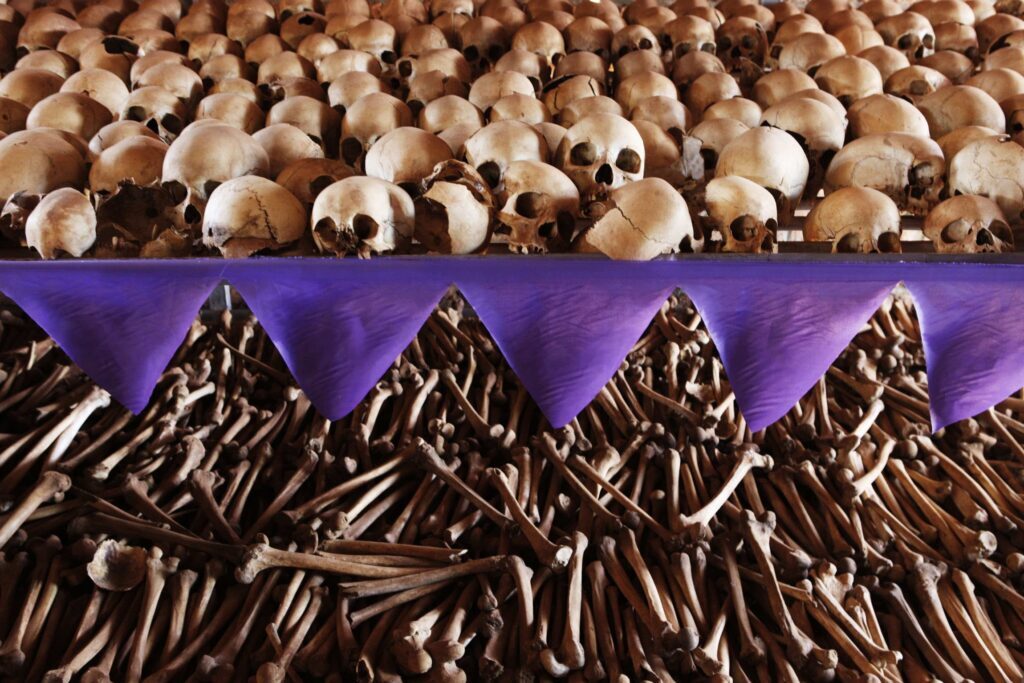(OSV News) — As the world recalled the Rwanda genocide, a survivor and now Jesuit scholar reflected on the power of forgiveness and leadership in recovering from atrocities, both in Rwanda and worldwide.
Jesuit Father Marcel Uwineza, president of Hekima University College in Nairobi, Kenya, spoke April 7 at Fairfield University in Fairfield, Connecticut, on “Healing a Wounded World: The Miracle of Forgiveness and Sowing the Yeast of Leadership.”
In his talk — which he began with a moment of silence to remember those slain, as well as those “who have never recovered” — Father Uwineza said he hoped to “give testimony to the power of forgiveness,” having extended that even “to the man who killed my siblings and exhumed the bones of my father.”
Lasting wounds
The priest, who ultimately lost more than 40 members of his family to the genocide, also highlighted “why leadership matters in this world,” which is “increasingly fractured by war and conflict and, of course, deepening inequality.”

The presentation took place on the International Day of Reflection on the Genocide in Rwanda. The commemoration was established by the United Nations in 2003 to commemorate the 1994 genocide, which saw an estimated 800,000 to more than 1 million Tutsi people systematically killed by Hutu perpetrators over a period of several weeks.
As part of the attacks, between 150,000 to 250,000 women were also raped.
“That has left lasting wounds,” Father Uwineza noted. “Many women now live with children born from rape.”
Those taking part in the genocide — which had been preceded by decades of ethnic conflicts fostered by colonial powers — were prosecuted at both the local and international levels, with Rwanda’s government establishing a participatory justice system known as “Gacaca” and the U.N. convening the International Criminal Tribunal for Rwanda.
In 2017, Pope Francis asked forgiveness for “the sins and failings of the Church and its members” during the genocide, as some Catholic clergy and religious had “succumbed to hatred and violence, betraying their own evangelical mission” through their participation in the killings.
In some cases, clergy and religious simply refused to help those fleeing the attacks, as Father Uwineza experienced firsthand.
A teenager when the genocide began, he and his family at one point sought refuge at a Catholic church. The parish priest not only denied them shelter — he ordered the church locked.

At the same time, said Father Uwineza, other clergy and laypersons assisted them, showing the “nuance” and “complexity” of human behavior even amid the atrocities.
“Please don’t put everyone in the same category,” he cautioned. “There were wonderful people there.”
Journey to forgiveness
Still, he found himself having to scale “a big mountain of hatred and desire for revenge” following the killings.
“You are saved, certainly; you are no longer under a genocide, but now you have an interior war,” he said.
He admitted to “not stepping (into) church for nearly three years, from 1994 to 1997.”
Following his mother’s death after the genocide, he was taken in by an uncle who insisted he attend Mass. He met several Jesuit priests, and eventually joined the order in 2001.
At the end of his novitiate, he paid a visit to the tombs of his parents — and came face-to-face with the man who had killed his siblings and had desecrated the grave of his father, slain prior to the genocide.
Released by the government after admitting his crimes — which included dumping the bodies into a pit latrine — the man asked for forgiveness, kneeling before the young Jesuit.
“And then I’m asking (myself), ‘Even if I forgive, will they come back? Am I safe, or am I also going to be killed?'” Father Uwineza recalled.
He described feeling “invaded by something” beyond himself, allowing him to extend forgiveness to the man and to feel “free” as a result.
Yet Father Uwineza, quoting Pope Francis’ encyclical “Fratelli Tutti,” stressed that “those who truly forgive do not forget. Instead, they choose not to yield to the same destructive force that caused them so much suffering. They break the vicious circle; they halt the advance of the forces of destruction.”
“Forgiveness means making a decision to remember ourselves differently,” said Father Uwineza. “Forgiveness also engages the community to rebuild.”

A ‘mirror to the world’
Rwanda serves as “a mirror to the world” of how a society with “multilayered wounds” and “a landscape of cries” can embark on a path to healing, he said.
Part of the task requires fighting genocidal ideology through education, awareness, memory preservation, legal measures and an ongoing search for truth and justice, he said.
Forgiveness entails an authentic acknowledgment of harm, empathy and understanding, a relinquishing of resentment, a commitment to reconciliation and constructive action, said the priest.
Transformational leadership — which he described as “the awesome responsibility to see those around us rise” — is crucial in restoring scarred societies, he said.
Father Uwineza pointed out that that Rwanda’s leaders had prioritized national unity, economic recovery and justice in the wake of the genocide. Education, gender equality and sustainable development were key parts of that effort.
Rwanda can serve as a model for other nations and for the international community in overcoming hatred and division to promote human flourishing, said Father Uwineza.
“Today, despite the limitations and weaknesses, Rwanda stands as an example of how reconciliation can be achieved,” he said.
Gina Christian is a multimedia reporter for OSV News. Follow her on X @GinaJesseReina.




